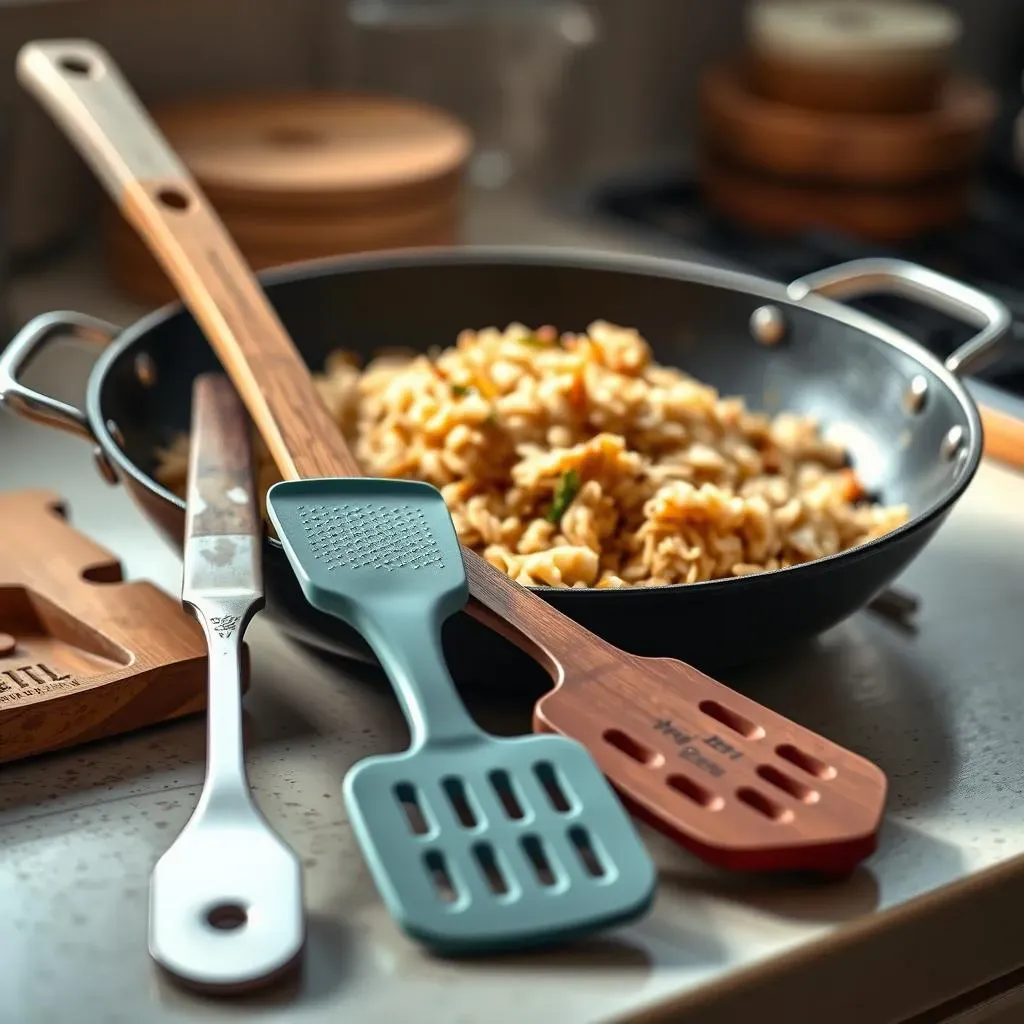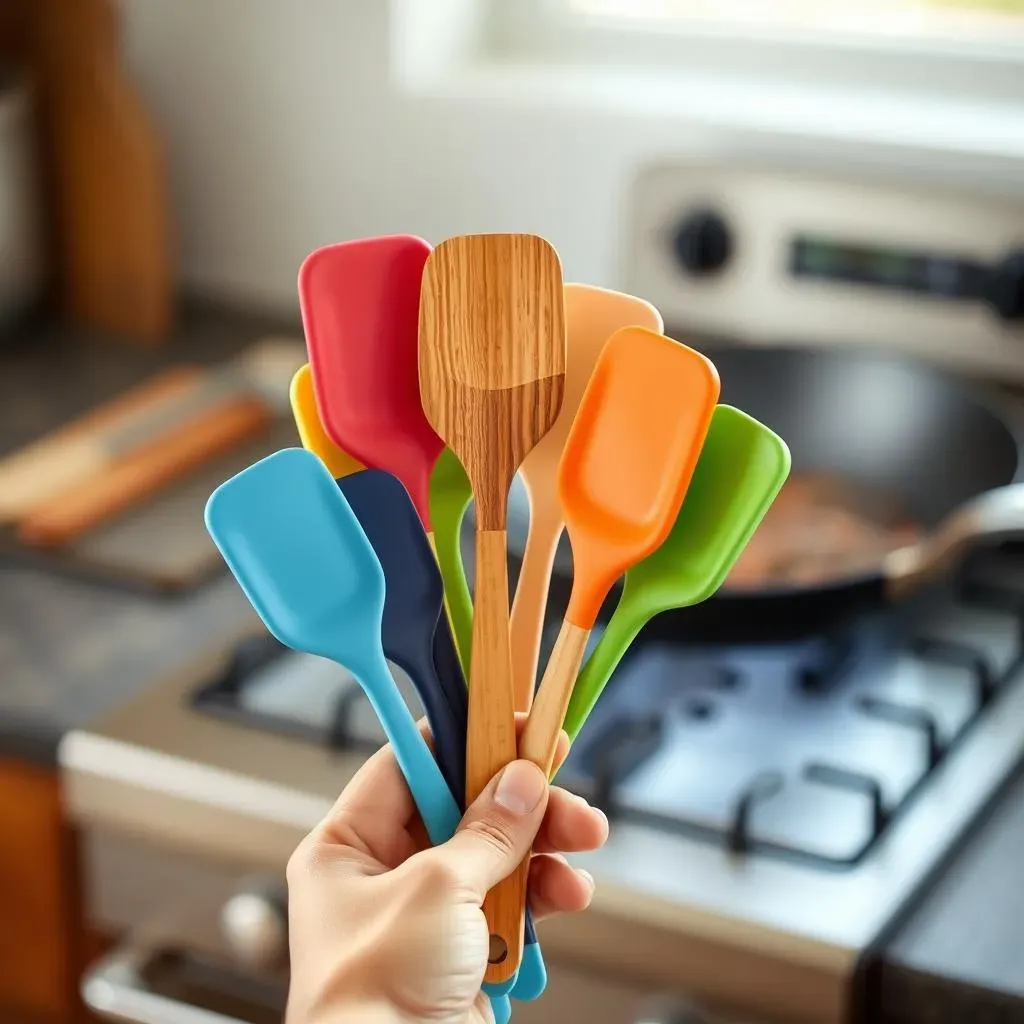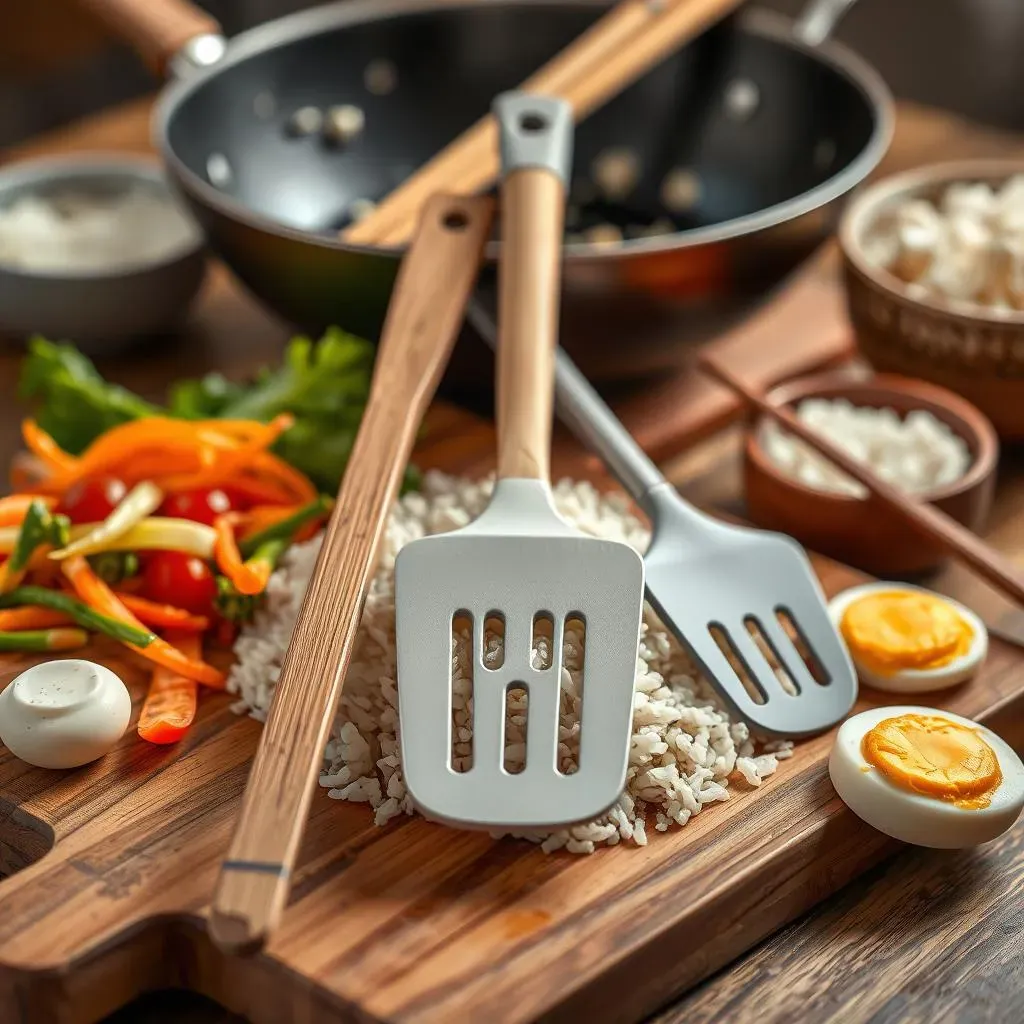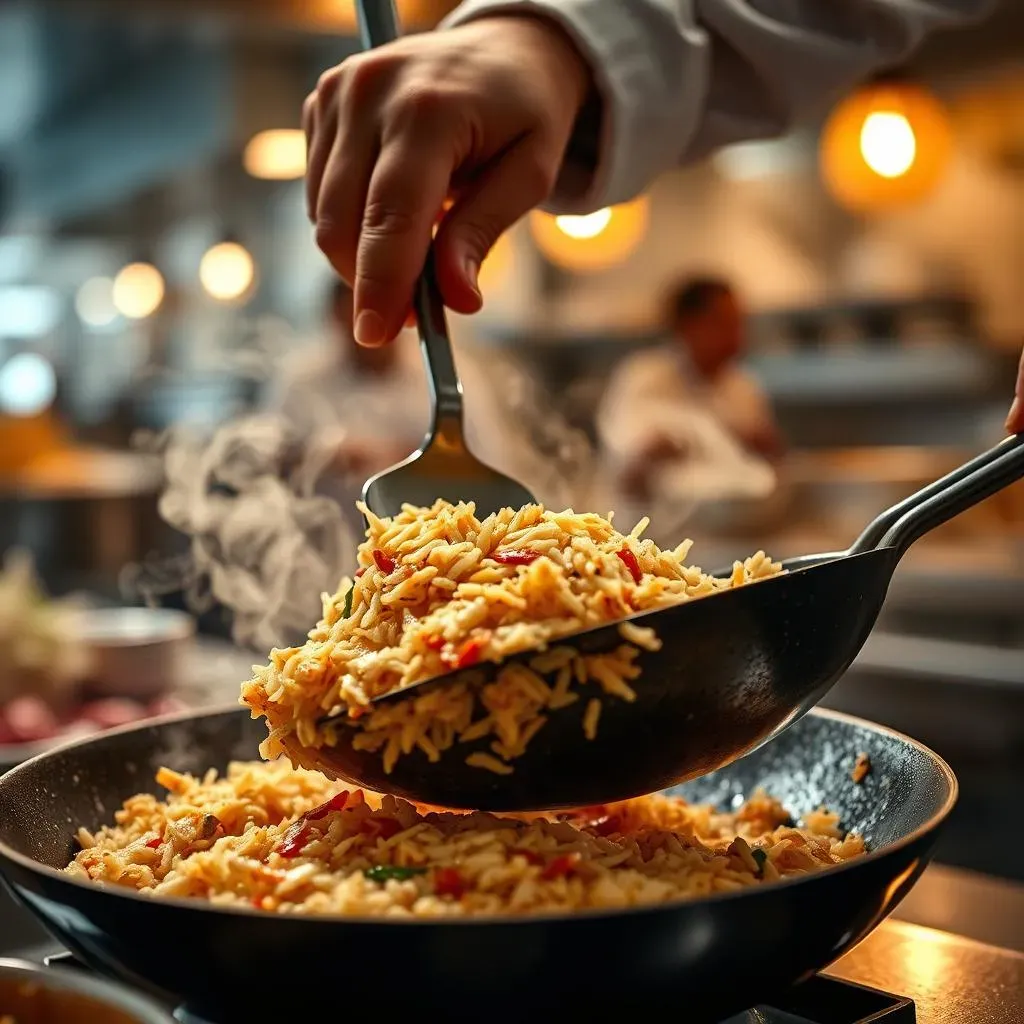Table of Contents
Fried rice, that comforting dish of perfectly cooked rice, savory vegetables, and succulent protein, is a culinary masterpiece. But achieving that restaurant-quality texture and flavor at home often hinges on one seemingly simple tool: the spatula. This isn't just any spatula; it's the key to unlocking perfectly fluffy, non-sticky fried rice. This article is your comprehensive guide to finding the best spatula accessories for fried rice, transforming your cooking experience from frustrating to fantastic. We’ll explore different spatula types, helping you choose the perfect tool based on your cooking style and preferences. We'll then dive into detailed reviews of top-performing spatulas and essential accessories, comparing features and highlighting their strengths. By the end, you'll be equipped with the knowledge to confidently select the best spatula accessories for fried rice, elevating your culinary skills and ensuring every fried rice creation is a resounding success. Get ready to master the art of fried rice, one perfectly flipped grain at a time!
Essential Spatula Types for Perfect Fried Rice

Essential Spatula Types for Perfect Fried Rice
Understanding the Spatula Landscape
So, you're diving into the world of fried rice spatulas? Fantastic! It's a surprisingly deep topic, but don't worry, I'll guide you. The key is understanding that not all spatulas are created equal. Different materials and shapes dramatically affect your fried rice experience. Think of it like choosing the right tool for a job; you wouldn't use a hammer to screw in a screw, right? Similarly, a flimsy plastic spatula won't cut it (pun intended!) for the high-heat action of stir-frying. We need durability and maneuverability.
Spatula Type | Material | Pros | Cons |
|---|---|---|---|
Metal Spatula | Stainless Steel | Durable, heat-resistant, easy to clean | Can scratch non-stick pans |
Wooden Spatula | Bamboo or Hardwood | Won't scratch pans, good for scraping | Can absorb oils, needs more care |
Silicone Spatula | Silicone | Heat-resistant, non-stick, flexible | Can be less durable than metal |
Let's break down the main players. Metal spatulas, usually stainless steel, are workhorses. They're tough, handle high heat like champs, and are a breeze to clean. However, they can scratch your non-stick pans, so be mindful. Wooden spatulas, often made from bamboo or hardwood, are gentler on your cookware, excellent for scraping up those delicious browned bits. They're also naturally non-stick, but they do absorb oils and need a bit more love and care. Finally, silicone spatulas are the flexible friends of the non-stick pan world. They're great for flipping delicate ingredients and getting into corners, but they might not be as durable as metal for serious scraping.
- Consider your cookware: Non-stick? Go for wood or silicone.
- Think about your cooking style: Aggressive stir-frying? Metal might be your best bet.
- Look for a comfortable handle: You'll be holding this thing for a while!
Choosing the Right Spatula for Your Cooking Style

Choosing the Right Spatula for Your Cooking Style
Matching Spatula to Your Fried Rice Technique
Okay, so you've got a handle on the different spatula types. Now, let's talk about how your personal cooking style should influence your choice. Are you a whirlwind of motion, tossing ingredients with the speed and grace of a seasoned chef? Or are you more deliberate, preferring a gentle approach? Your technique directly impacts the ideal spatula. For example, a super-fast, aggressive stir-fry demands a durable, heat-resistant metal spatula that can withstand the intense heat and constant movement. It needs to be strong enough to break up rice clumps without bending or breaking. On the other hand, if you're more methodical and gentle in your approach, a wooden or silicone spatula might be a better fit. These are kinder to your pan and are excellent for flipping delicate ingredients without damaging them.
- Aggressive Stir-Frying: Metal spatula – durability and heat resistance are key.
- Gentle Stir-Frying: Wooden or silicone spatula – protects non-stick surfaces.
- Delicate Ingredients: Silicone spatula – flexibility and non-stick properties are crucial.
Think about the size and shape too. A wide spatula is great for quickly incorporating ingredients, while a narrower one is perfect for getting into the corners of the wok or pan to scrape up every last bit of deliciousness. Consider the length of the handle as well. Do you prefer a longer handle to keep your hands far from the heat? Or are you comfortable with a shorter handle for more control? It's all about finding the perfect balance between comfort and efficiency. Remember, the best spatula for you is the one that feels right in your hand and helps you achieve your desired fried rice perfection.
Cooking Style | Recommended Spatula Material | Ideal Spatula Shape |
|---|---|---|
Fast & Aggressive | Metal (Stainless Steel) | Wide, flat blade |
Gentle & Methodical | Wood or Silicone | Narrow or slightly curved blade |
Delicate Ingredients | Silicone | Flexible, thin blade |
Best Spatula Accessories for Fried Rice: A Detailed Review

Best Spatula Accessories for Fried Rice: A Detailed Review
Top-Rated Spatulas for Fried Rice Mastery
Let's get down to brass tacks – the spatulas themselves! I've spent hours (okay, maybe days) researching and testing various spatulas, and I'm ready to share my top picks. Remember, the "best" spatula depends on your personal preferences and cooking style, but these are consistently praised for their performance and durability. We're looking for a balance of flexibility, heat resistance, and ease of cleaning. Nobody wants to spend ages scrubbing stuck-on rice, right? Think about the size and shape, too. A wider spatula is excellent for quickly incorporating ingredients, while a narrower one is perfect for scraping up every last delicious morsel from the pan.
Spatula | Material | Pros | Cons |
|---|---|---|---|
Example Metal Spatula (brand name here) | Stainless Steel | Durable, heat-resistant, easy to clean | May scratch non-stick surfaces |
Example Wooden Spatula (brand name here) | Bamboo | Gentle on cookware, good for scraping | Absorbs oils, requires more care |
Example Silicone Spatula (brand name here) | Silicone | Heat-resistant, non-stick, flexible | Can be less durable than metal |
Beyond the Spatula: Essential Fried Rice Accessories
But wait, there's more! A truly amazing fried rice experience goes beyond just the spatula. Consider these essential accessories that can elevate your cooking game and make the whole process smoother and more enjoyable. A good wok, for example, is a game-changer. Its curved sides allow for efficient tossing and even cooking. Don't forget about a sturdy pair of chopsticks – useful for quickly incorporating ingredients and breaking up rice clumps. And finally, a handy rice paddle can be a lifesaver when it comes to serving up your delicious creation.
- Wok: The ideal vessel for even cooking and efficient tossing.
- Chopsticks: Perfect for quick ingredient incorporation and rice clump breaking.
- Rice Paddle: Makes serving your fried rice a breeze.
Mastering the Art of Fried Rice with the Best Spatula Accessories

Mastering the Art of Fried Rice with the Best Spatula Accessories
The Art of the Flip: Technique and Timing
Now that you've got the right tools, let's talk technique. Fried rice isn't just about tossing ingredients together; it's a dance of precision and timing. The key is to use a swift, controlled motion, ensuring even cooking and preventing sticking. Start with a well-heated wok or pan, and add your ingredients in stages. Don't overcrowd the pan; work in batches if necessary. Use your spatula to constantly lift, toss, and stir the ingredients, ensuring everything cooks evenly. The goal is to get that beautiful, slightly crispy texture on the rice without burning anything. Remember, practice makes perfect! Each flip should be purposeful, not just a random toss. With practice, you'll develop a feel for the right amount of force and movement needed to achieve perfectly cooked fried rice.
Step | Action | Spatula Technique |
|---|---|---|
1 | Add oil to hot wok | Use spatula to spread oil evenly |
2 | Add rice, stir-fry | Lift and toss rice with spatula |
3 | Add protein, vegetables | Use spatula to incorporate ingredients |
4 | Season and serve | Use spatula to scrape up browned bits |
Temperature Control: The Secret Weapon
Mastering temperature control is paramount to fried rice success. High heat is essential for creating that characteristic crispy texture, but too much heat can lead to burnt rice and vegetables. A good spatula helps you monitor the cooking process. If the rice is sticking, lower the heat slightly. If the ingredients are cooking too slowly, increase the heat. A metal spatula's heat conductivity can actually help you gauge the temperature of the pan; it will get hotter faster than a wooden or silicone one. Pay attention to the sizzle; it's your guide. A gentle sizzle indicates perfect heat, while a loud, aggressive sizzle means it’s too hot. Experiment, learn, and adjust your technique until you find the sweet spot. Remember, consistent temperature is key to achieving uniform cooking and preventing those dreaded burnt bits.
- Start with high heat to create a crispy texture.
- Reduce heat if the rice sticks or burns.
- Monitor the sizzle – a gentle sizzle is ideal.
- Use a metal spatula to gauge the pan's temperature.
Seasoning and Serving: The Finishing Touches
Finally, don't underestimate the importance of seasoning and presentation. The right seasonings can transform your fried rice from good to extraordinary. Soy sauce, oyster sauce, sesame oil – these are just a few of the many flavorful options available. Taste as you go, adjusting the seasonings to your preference. The final flourish? Presentation matters! Use your spatula to create a beautiful, even mound of fried rice on the plate. Garnish with fresh herbs, sesame seeds, or a fried egg for an extra touch of elegance. Remember, even the simplest dish can be elevated with a little attention to detail. With the right tools, technique, and seasonings, you'll be creating restaurant-quality fried rice in no time.